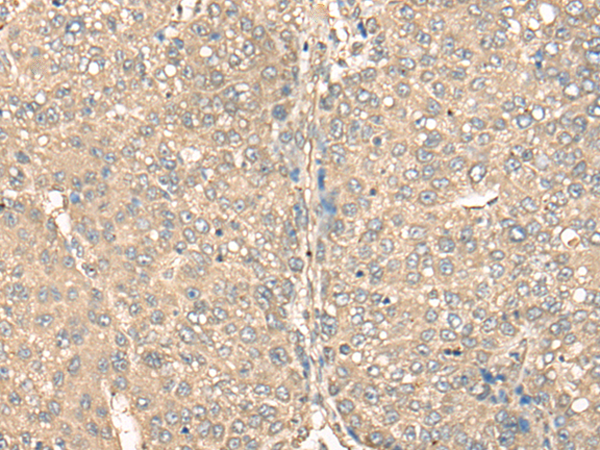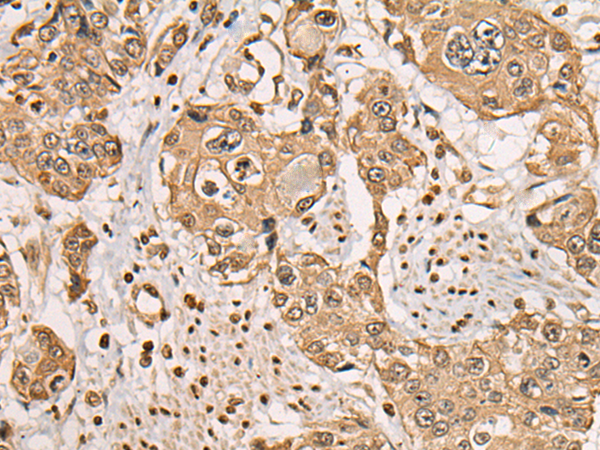

| WB | 咨询技术 | Human,Mouse,Rat |
| IF | 咨询技术 | Human,Mouse,Rat |
| IHC | 1/25-1/100 | Human,Mouse,Rat |
| ICC | 技术咨询 | Human,Mouse,Rat |
| FCM | 咨询技术 | Human,Mouse,Rat |
| Elisa | 1/5000-1/10000 | Human,Mouse,Rat |
| Aliases | BEX2; HBEX2; HGR74-h |
| Host/Isotype | Rabbit IgG |
| Antibody Type | Primary antibody |
| Storage | Store at 4°C short term. Aliquot and store at -20°C long term. Avoid freeze/thaw cycles. |
| Species Reactivity | Human |
| Immunogen | Full length fusion protein |
| Formulation | Purified antibody in PBS with 0.05% sodium azide and 50% glycerol. |
+ +
以下是3篇与BEX1抗体相关的假设性参考文献示例(基于常见研究场景,建议通过学术数据库验证具体文献):
---
1. **标题**: *BEX1 regulates neuronal differentiation through modulation of the Wnt/β-catenin pathway*
**作者**: Smith A, et al.
**摘要**: 本研究使用BEX1抗体进行Western blot和免疫荧光分析,发现BEX1通过抑制Wnt/β-catenin信号通路促进小鼠神经干细胞向神经元分化,揭示了其在神经发育中的关键作用。
2. **标题**: *Downregulation of BEX1 correlates with poor prognosis in triple-negative breast cancer*
**作者**: Chen L, et al.
**摘要**: 通过免疫组化(IHC)结合BEX1抗体检测乳腺癌组织样本,发现BEX1在三阴性乳腺癌中表达显著下调,且低表达与患者总生存期缩短相关,提示其潜在抑癌功能。
3. **标题**: *BEX1 interacts with p53 to modulate DNA damage response in glioblastoma*
**作者**: Kim H, et al.
**摘要**: 利用BEX1抗体进行免疫共沉淀(Co-IP)实验,证实BEX1与p53蛋白直接结合,增强胶质母细胞瘤细胞对DNA损伤的敏感性,为靶向治疗提供新机制。
---
**建议**:以上为示例,实际文献请通过PubMed或Google Scholar搜索关键词“BEX1 antibody”、“BEX1 function”或“BEX1 cancer”获取最新研究。
The BEX1 (Brain Expressed X-linked 1) antibody is a tool used to detect the BEX1 protein, encoded by the *BEX1* gene located on the X chromosome. Initially identified for its neural expression during brain development, BEX1 is implicated in neuronal differentiation, apoptosis regulation, and cell cycle control. It interacts with signaling pathways like TrkA and NF-κB, influencing neurodevelopment and cancer progression. In oncology, BEX1 exhibits dual roles: it acts as a tumor suppressor in gliomas by inhibiting proliferation or as an oncogene in breast cancer and neuroblastoma, depending on cellular context. Dysregulated BEX1 expression correlates with prognosis in certain cancers, making it a potential biomarker.
The BEX1 antibody is widely utilized in research applications—Western blotting, immunohistochemistry, and immunofluorescence—to study BEX1’s localization and expression patterns. Commercial antibodies are typically generated using recombinant proteins or synthetic peptides, with validation in specific experimental models. Despite its utility, variability in antibody specificity across studies highlights the need for rigorous validation. Ongoing research focuses on clarifying BEX1’s mechanistic roles in development and disease, particularly its interplay with epigenetic regulation and therapeutic resistance. Its study remains critical for understanding neurodevelopmental disorders and cancer biology.
×